英语中名词作动词
英语中名词作动词的例子50个

英语中名词做动词用的55个例句1. Don't baby your child.2. After dinner, please bus trays to Dish room.3. Thumb through any dictionary, and you will see pages of words followed by definition.4. I'd like to book three seats for tonight's concert.5. The chairman will now address to the meeting.6. His father booted him out of the house.7. He's always bossing his wife about.8. The escaped prisoner was cornered at last.9. Your behavior disgraces us all.10. Don't disorder my papers.11. I glimpsed Xiao Wang between the half-drawn curtains.12. I don't want to influence you either way, so I won't tell you my opinion.13. We must try and limit our expenditure.15. My mother is spooning sugar from the packet into a bowl.16. People were streaming out of the station.17. He is vacationing in the countryside.18. He intends to voyage across the .19. She is outdoors gardening every afternoon.20. He patterns himself upon his father.21.I am training you, not babysitting you!22. Stop mothering her,she’s 30 years old and can take care of herself perfectly wel1.23. Mr. Smith has authored a book on AIDS.24. You must pressure him to do it.25. Her dress is patterned upon a model.26. Dick is the man who used to partner Mary.27. Opposition to the war snowballed.28. We shall book through to .29. Don't fool away your time, my boy!30. Mr. Smith noons for half an hour every day.31. They have husbanded their farms very well.32. Students in Hong Kong can view a collection of more than 1oo rare species of goldfish in the .33. He doesn’t have all idea of his own. He just parrots what other people say.34. Jack peeled an apple.35. It is not easy to bone the fish, for it has hard plates.36. They stormed the speaker with questions.37. His refusal iced our enthusiasm.39. He 747ed to last weekend.40. Tom has his car serviced (=maintained) regularly.41. She managed to sandwich the repairs in between taking the kids to school and preparing lunch.42. Why not google you a girl friend at college?43. The head coach has decided to field two star footballers in the finals.44. Don’t believe him, he often use a gentle face to mask his real purpose.45. Shall I sugar the milk for you?46. Istambul is now peopled by 4 million Turks.47. What sort of people would he select to man his government?48.All the time he was in that country the secret police dogged his steps.49. He is there fishing for information.51. It seems that one’s favourite work doesn’t make one age,” she replied with a smile.52. The minister heads the delegation to visit .53. Life in this university, which schools some 13,000 students, goes on as usual.54. He was there to party, and was delighted to see his old friend.55. The law now generally presumes that the husband is the legal father if his wife has the child, even if he didn’t father it.。
英语中一些名词作动词的妙用

在英语中,有一些名词可以用作动词,这被称为名词动词化。
以下是一些常见的名词动词化用法:
Email(电子邮件)- 作为动词表示发送或接收电子邮件。
例如,“我会给你发电子邮件。
”
Google(谷歌)- 作为动词表示使用谷歌搜索引擎搜索信息。
例如,“我可以谷歌一下这个问题。
”
Text(文本)- 作为动词表示发送短信。
例如,“我会给你发一条短信。
”
Fax(传真)- 作为动词表示通过传真发送文件。
例如,“我会把文件传真给你。
”
Microwave(微波炉)- 作为动词表示使用微波炉加热食物。
例如,“我可以把饭放进微波炉里。
”
Zoom(缩放)- 作为动词表示使用Zoom视频会议软件进行在线会议。
例如,“我们可以在Zoom上开会。
”
Photoshop(Photoshop软件)- 作为动词表示使用Photoshop软件编辑照片。
例如,“我会用Photoshop编辑这张照片。
”
这些是一些常见的名词动词化的用法,这种用法在现代英语中越来越常见。
名词加冠词加名词作动词

名词加冠词加名词作动词(最新版)目录1.引言2.名词加冠词加名词作动词的构成方式3.这种结构的语法规则和用法4.实际应用示例5.结语正文一、引言在英语中,名词加冠词加名词作动词的结构是一种常见的语法现象。
这种结构具有一定的语法规则和用法,可以为句子增添生动的表达方式。
本文将详细介绍这种结构的构成方式、语法规则和实际应用。
二、名词加冠词加名词作动词的构成方式名词加冠词加名词作动词的结构,通常由三个部分组成:一个名词作为主语,一个不定冠词(如 a/an)作为限定词,另一个名词作为谓语动词。
例如:a book(一本书),a cat(一只猫)。
在这种结构中,第二个名词失去了其原有的名词意义,转化为动词意义,表示一个动作或状态。
三、这种结构的语法规则和用法1.在名词加冠词加名词作动词的结构中,第二个名词通常表示一个可数名词,并且通常是不可数名词。
例如:a piece of paper(一张纸),a bottle of water(一瓶水)。
2.这种结构的动词意义通常表示一种临时的动作或状态,而非永久性的属性。
例如:a glass of water(一杯水)表示的是临时的动作,而 awater glass(一个水杯)表示的是永久性的属性。
3.在使用这种结构时,第一个名词和第二个名词之间通常存在一定的逻辑关系,如所属关系、制作关系等。
例如:a letter of apology(一封道歉信),a cake of soap(一块肥皂)。
四、实际应用示例在实际应用中,名词加冠词加名词作动词的结构可以用来描述各种各样的动作或状态。
例如:- She is a friend of mine.(她是我的一个朋友。
)- I bought a box of chocolates.(我买了一盒巧克力。
)- He is a teacher of English.(他是一名英语教师。
)五、结语总之,名词加冠词加名词作动词的结构是英语中一种常见的语法现象。
英语中名词转化成动词
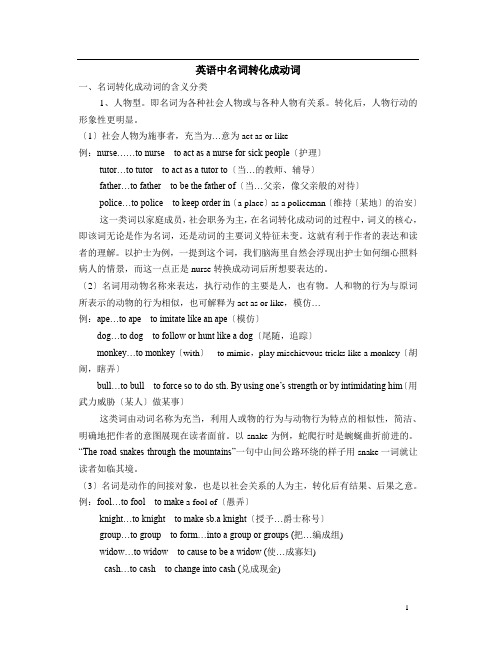
英语中名词转化成动词一、名词转化成动词的含义分类1、人物型。
即名词为各种社会人物或与各种人物有关系。
转化后,人物行动的形象性更明显。
〔1〕社会人物为施事者,充当为…意为act as or like例:nurse……to nurse to act as a nurse for sick people〔护理〕tutor…to tutor to act as a tutor to〔当…的教师、辅导〕father…to father to be the father of〔当…父亲,像父亲般的对待〕police…to police to keep order in〔a place〕as a policeman〔维持〔某地〕的治安〕这一类词以家庭成员,社会职务为主,在名词转化成动词的过程中,词义的核心,即该词无论是作为名词,还是动词的主要词义特征未变。
这就有利于作者的表达和读者的理解。
以护士为例,一提到这个词,我们脑海里自然会浮现出护士如何细心照料病人的情景,而这一点正是nurse转换成动词后所想要表达的。
〔2〕名词用动物名称来表达,执行动作的主要是人,也有物。
人和物的行为与原词所表示的动物的行为相似,也可解释为act as or like,模仿…例:ape…to ape to imitate like an ape〔模仿〕dog…to dog to follow or hunt like a dog〔尾随,追踪〕monkey…to monkey〔with〕to mimic,play mischievous tricks like a monkey〔胡闹,瞎弄〕bull…to bull to force so to do sth. By using one’s strength or by intimidating him〔用武力威胁〔某人〕做某事〕这类词由动词名称为充当,利用人或物的行为与动物行为特点的相似性,简洁、明确地把作者的意图展现在读者面前。
英语名词的动词功能
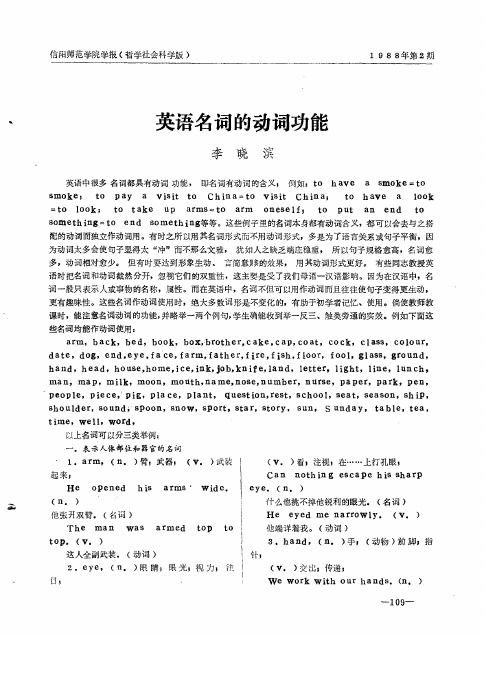
t l i
,
。
f
o
o n
l
。
e n
o
u
g h
t
o
b
e
lie
V
e
中锋用 头将球顶入球 门
S m ith (
V
。
。
n
5
u
h
t
r a s
(
)
。
,
5
n a
m
。
e
h
d
s
th
e
l is t
我们不是 傻 瓜 H
e
不会相信这种 鬼话
a
( 名词 )
e
) ( 动词 )
n
。 。
f
。
o o
ls
、
w
a
y
h is
t im
a n
、 、
这些名词 作动 词 使用 时
:
,
绝大多 数词 形是不变化 的
使用
。
倘使教 师教 例如下面 这
能注意名词 动词 的 功能 并略举一两个例 句 学生确能 收到举 一 反三
触类旁 通的实效
。
些名词 均 能作 动词 使用
a r
m d
,
,
b
o
a
,
e
k
,
b
,
e
d
,
b
,
o o
k
e
,
,
b f
i e
a
o x r
s 二
a =
t
o
v
o
is it
n e
s
C h in
英语名词用作动词与零词缀派生
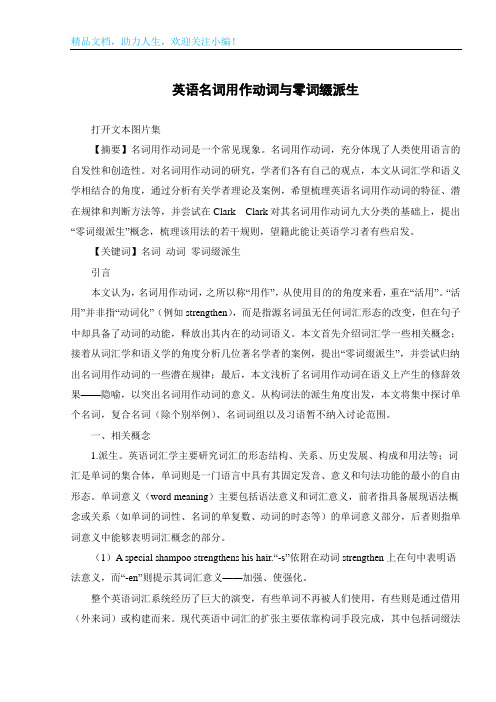
英语名词用作动词与零词缀派生打开文本图片集【摘要】名词用作动词是一个常见现象。
名词用作动词,充分体现了人类使用语言的自发性和创造性。
对名词用作动词的研究,学者们各有自己的观点,本文从词汇学和语义学相结合的角度,通过分析有关学者理论及案例,希望梳理英语名词用作动词的特征、潜在规律和判断方法等,并尝试在Clark Clark对其名词用作动词九大分类的基础上,提出“零词缀派生”概念,梳理该用法的若干规则,望籍此能让英语学习者有些启发。
【关键词】名词动词零词缀派生引言本文认为,名词用作动词,之所以称“用作”,从使用目的的角度来看,重在“活用”。
“活用”并非指“动词化”(例如strengthen),而是指源名词虽无任何词汇形态的改变,但在句子中却具备了动词的动能,释放出其内在的动词语义。
本文首先介绍词汇学一些相关概念;接着从词汇学和语义学的角度分析几位著名学者的案例,提出“零词缀派生”,并尝试归纳出名词用作动词的一些潜在规律;最后,本文浅析了名词用作动词在语义上产生的修辞效果——隐喻,以突出名词用作动词的意义。
从构词法的派生角度出发,本文将集中探讨单个名词,复合名词(除个别举例)、名词词组以及习语暂不纳入讨论范围。
一、相关概念1.派生。
英语词汇学主要研究词汇的形态结构、关系、历史发展、构成和用法等;词汇是单词的集合体,单词则是一门语言中具有其固定发音、意义和句法功能的最小的自由形态。
单词意义(word meaning)主要包括语法意义和词汇意义,前者指具备展现语法概念或关系(如单词的词性、名词的单复数、动词的时态等)的单词意义部分,后者则指单词意义中能够表明词汇概念的部分。
(1)A special shampoo strengthens his hair.“-s”依附在动词strengthen上在句中表明语法意义,而“-en”则提示其词汇意义——加强、使强化。
整个英语词汇系统经历了巨大的演变,有些单词不再被人们使用,有些则是通过借用(外来词)或构建而来。
英语中名词转化成动词
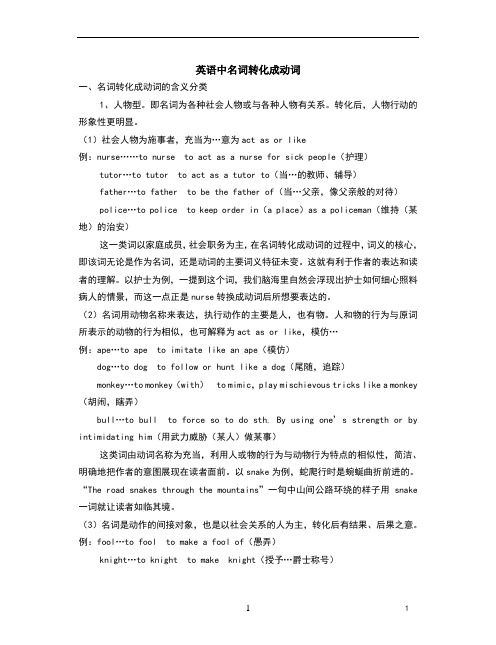
英语中名词转化成动词一、名词转化成动词的含义分类1、人物型。
即名词为各种社会人物或与各种人物有关系。
转化后,人物行动的形象性更明显。
(1)社会人物为施事者,充当为…意为act as or like例:nurse……to nurse to act as a nurse for sick people(护理)tutor…to tutor to act as a tutor to(当…的教师、辅导)father…to father to be the father of(当…父亲,像父亲般的对待)police…to police to keep order in(a place)as a policeman(维持(某地)的治安)这一类词以家庭成员,社会职务为主,在名词转化成动词的过程中,词义的核心,即该词无论是作为名词,还是动词的主要词义特征未变。
这就有利于作者的表达和读者的理解。
以护士为例,一提到这个词,我们脑海里自然会浮现出护士如何细心照料病人的情景,而这一点正是nurse转换成动词后所想要表达的。
(2)名词用动物名称来表达,执行动作的主要是人,也有物。
人和物的行为与原词所表示的动物的行为相似,也可解释为act as or like,模仿…例:ape…to ape to imitate like an ape(模仿)dog…to dog to follow or hunt like a dog(尾随,追踪)monkey…to monkey(with) to mimic,play mischievous tricks like a monkey (胡闹,瞎弄)bull…to bull to force so to do sth. By using one’s strength or by intimidating him(用武力威胁(某人)做某事)这类词由动词名称为充当,利用人或物的行为与动物行为特点的相似性,简洁、明确地把作者的意图展现在读者面前。
英语名词转换为动词,动词转换为名词,形容词转换成副词,名词转换为形容词。
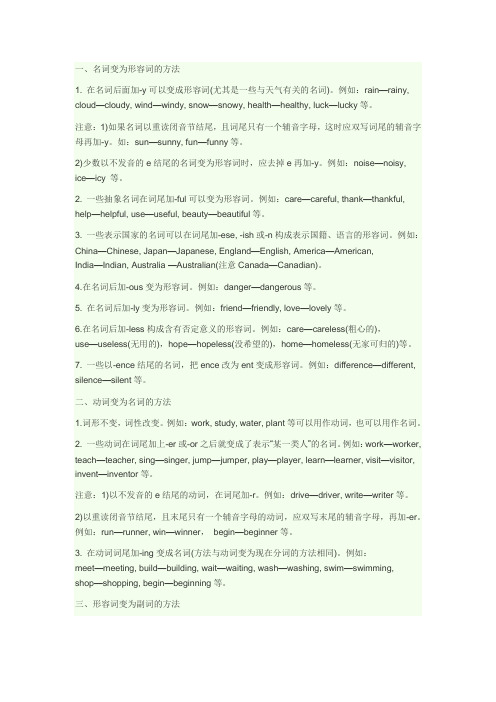
一、名词变为形容词的方法1. 在名词后面加-y可以变成形容词(尤其是一些与天气有关的名词)。
例如:rain—rainy, cloud—cloudy, wind—windy, snow—snowy, health—healthy, luck—lucky等。
注意:1)如果名词以重读闭音节结尾,且词尾只有一个辅音字母,这时应双写词尾的辅音字母再加-y。
如:sun—sunny, fun—funny等。
2)少数以不发音的e结尾的名词变为形容词时,应去掉e再加-y。
例如:noise—noisy, ice—icy 等。
2. 一些抽象名词在词尾加-ful可以变为形容词。
例如:care—careful, thank—thankful, help—helpful, use—useful, beauty—beautiful等。
3. 一些表示国家的名词可以在词尾加-ese, -ish或-n构成表示国籍、语言的形容词。
例如:China—Chinese, Japan—Japanese, England—English, America—American, India—Indian, Australia —Australian(注意Canada—Canadian)。
4.在名词后加-ous变为形容词。
例如:danger—dangerous等。
5. 在名词后加-ly变为形容词。
例如:friend—friendly, love—lovely等。
6.在名词后加-less构成含有否定意义的形容词。
例如:care—careless(粗心的),use—useless(无用的),hope—hopeless(没希望的),home—homeless(无家可归的)等。
7. 一些以-ence结尾的名词,把ence改为ent变成形容词。
例如:difference—different, silence—silent等。
二、动词变为名词的方法1.词形不变,词性改变。
浅析英语中的名词动词化现象

浅析英语中的名词动词化现象摘要:“名词动词化”是一个十分常见的语言现象,它有其自身的语言学理论依据和实际应用的特点。
本文从人体部位、动物名称和表示气候名称的动词化现象三方面分析英语中名转动词的实际运用特点。
关键词:名词;动词;名词动词化;语言学理论引言在现代英语中,越来越多的名词被用作动词。
英语中的“名词动词化”在词汇中是最活跃、数量最多的[1],比例约为l0.5%。
“名词动词化”, 即名词转化为动词,就是名词不作任何形态的变化直接用作动词。
名词被动词化后,常常表示具有该名词的活动特点或性质特征的动作,语言既精炼又生动,富于表现力,能引起读者的兴趣和共鸣。
一、名词动词化的语言学理论依据名词动词化有其自身的语言学理论依据。
1.1名词动词化的语义学原则语义学上研究的词的功能转换(functional shift)是指在句子中,一个词可以从某一词类转用作另一词类,名词转化动词是其中一类[2]。
英语名词动词化具有“语义增值”之效,即除了增加原名词所没有的描述性和过程化动作意味之外,更主要的还在于它能激发读者的心理联想。
因为根据意象理论,语言信息是以意象的形式储存于记忆之中。
名词动词化的最大优势就在于能迅速激起读者记忆储存中该名词的动作意象,使原名词在其原语义基础上衍生出动作、状态、意象、手段等意味来。
1.2名词动词化的语用学原则从语用学的角度来看,最理想的语言表达方式就是能够用最经济的话语来表达最充分的信息[3]。
英语名词的动词化现象恰恰体现了这种“语言经济原则”或“语言效率原则”,因而被广泛应用。
1.3名词动词化的修辞效能名词到动词的转化既能体现“语言经济原则”,又能提高语言的表达效果,达到生动、形象、言简意赅的修辞目的。
1.4 名词动词化的认知语言学理据在认知语言学看来,名词转换为动词属于人们认知侧面的转换。
人们以不同的方式描述想象情境的某些方面,即人们认为哪些成分是突显的,当名词被转换为动词时,其意象已经不是事物,人们的感知侧面由事物转向其突显动作的一面。
英语中动词名词
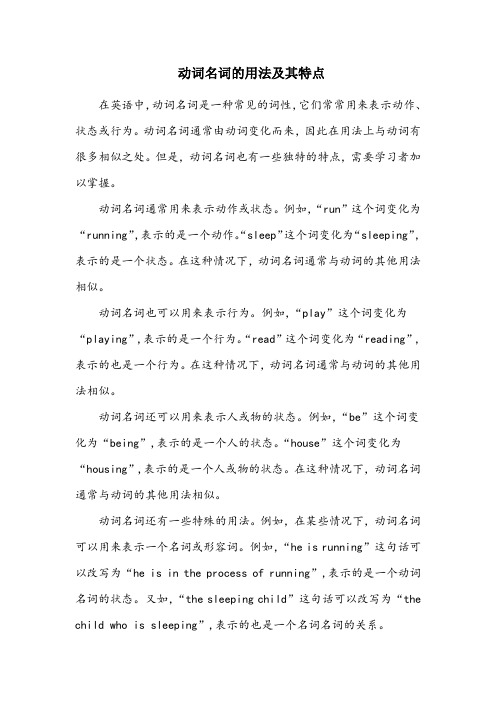
动词名词的用法及其特点在英语中,动词名词是一种常见的词性,它们常常用来表示动作、状态或行为。
动词名词通常由动词变化而来,因此在用法上与动词有很多相似之处。
但是,动词名词也有一些独特的特点,需要学习者加以掌握。
动词名词通常用来表示动作或状态。
例如,“run”这个词变化为“running”,表示的是一个动作。
“sleep”这个词变化为“sleeping”,表示的是一个状态。
在这种情况下,动词名词通常与动词的其他用法相似。
动词名词也可以用来表示行为。
例如,“play”这个词变化为“playing”,表示的是一个行为。
“read”这个词变化为“reading”,表示的也是一个行为。
在这种情况下,动词名词通常与动词的其他用法相似。
动词名词还可以用来表示人或物的状态。
例如,“be”这个词变化为“being”,表示的是一个人的状态。
“house”这个词变化为“housing”,表示的是一个人或物的状态。
在这种情况下,动词名词通常与动词的其他用法相似。
动词名词还有一些特殊的用法。
例如,在某些情况下,动词名词可以用来表示一个名词或形容词。
例如,“he is running”这句话可以改写为“he is in the process of running”,表示的是一个动词名词的状态。
又如,“the sleeping child”这句话可以改写为“the child who is sleeping”,表示的也是一个名词名词的关系。
总结起来,动词名词在英语中是一种常见的词性,其用法与动词有很多相似之处。
但是,动词名词也有一些独特的特点,需要学习者加以掌握。
学习者应该通过不断的练习来加深对动词名词的理解,从而更好地运用这种词性。
初中英语 名词动词用法

初中英语名词动词用法在学习英语的过程中,名词和动词是最基础、最常用的词类之一。
掌握名词和动词的用法对于语言的运用和表达能力至关重要。
本文将分别介绍名词和动词的基本用法,帮助初中生更好地理解和运用这两个词类。
一、名词的用法名词是用来表示人、事物、地点、抽象概念等的词语,可以用来指代具体和抽象的事物。
根据其在句子中的作用,名词可以分为以下几种情况:1.作主语:名词可以作为句子的主语,来说明主语是什么或者是谁。
例如:- Children like to play in the park.(孩子们喜欢在公园里玩。
)- Music brings people joy.(音乐给人们带来快乐。
)2.作宾语:名词可以作为动词的宾语,接受动作的影响。
例如:- I bought a new book yesterday.(我昨天买了一本新书。
)- Can you lend me your pen?(你能借给我你的钢笔吗?)3.作表语:名词可以作为系动词的表语,描述或说明主语是什么。
例如:- The dog is an animal.(这只狗是一种动物。
)- My dream is to become a doctor.(我的梦想是成为一名医生。
)4.作定语:名词可以作为定语修饰其他名词,起到进一步描述的作用。
例如:- I have a black cat.(我有一只黑猫。
)- She bought a new dress.(她买了一条新裙子。
)5.作状语:名词可以作为状语来修饰或限定动词、形容词、副词等的含义。
例如:- He walks to school every day.(他每天步行去上学。
)- We went for a swim in the lake.(我们去湖里游泳。
)6.作补语:名词可以作为动词的宾语补足语,对动词的含义进行补充说明。
例如:- Can you make him your friend?(你能把他变成你的朋友吗?)- We considered him a good leader.(我们认为他是个好的领导。
英语中名词转化成动词
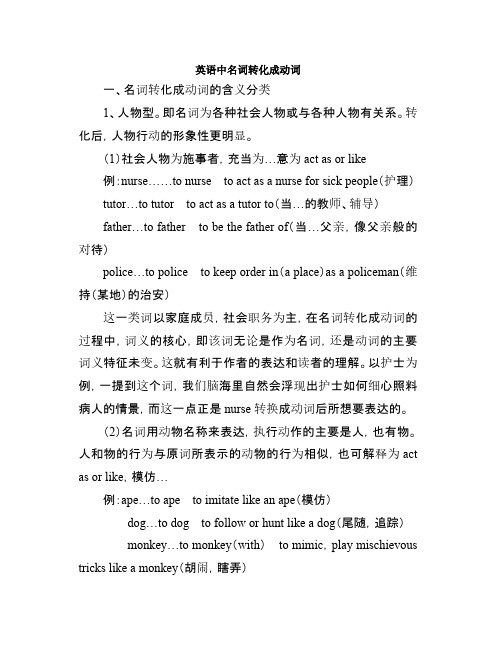
英语中名词转化成动词一、名词转化成动词的含义分类1、人物型。
即名词为各种社会人物或与各种人物有关系。
转化后,人物行动的形象性更明显。
(1)社会人物为施事者,充当为…意为act as or like例:nurse……to nurse to act as a nurse for sick people(护理)tutor…to tutor to act as a tutor to(当…的教师、辅导)father…to father to be the father of(当…父亲,像父亲般的对待)police…to police to keep order in(a place)as a policeman(维持(某地)的治安)这一类词以家庭成员,社会职务为主,在名词转化成动词的过程中,词义的核心,即该词无论是作为名词,还是动词的主要词义特征未变。
这就有利于作者的表达和读者的理解。
以护士为例,一提到这个词,我们脑海里自然会浮现出护士如何细心照料病人的情景,而这一点正是nurse转换成动词后所想要表达的。
(2)名词用动物名称来表达,执行动作的主要是人,也有物。
人和物的行为与原词所表示的动物的行为相似,也可解释为act as or like,模仿…例:ape…to ape to imitate like an ape(模仿)dog…to dog to follow or hunt like a dog(尾随,追踪)monkey…to monkey(with)to mimic,play mischievous tricks like a monkey(胡闹,瞎弄)bull…to bull to force so to do sth. By using one’s strength or by intimidating him(用武力威胁(某人)做某事)这类词由动词名称为充当,利用人或物的行为与动物行为特点的相似性,简洁、明确地把作者的意图展现在读者面前。
英语名词转换为动词,动词转换为名词,形容词转换成副词,名词转换为形容词

英语名词转换为动词,动词转换为名词,形容词转换成副词,名词转换为形容词The Standardization Office was revised on the afternoon of December 13, 2020一、名词变为形容词的方法1. 在名词后面加-y可以变成形容词(尤其是一些与天气有关的名词)。
例如:rain—rainy, cloud—cloudy, wind—windy, snow—snowy, health—healthy, luck—lucky等。
注意:1)如果名词以重读闭音节结尾,且词尾只有一个辅音字母,这时应双写词尾的辅音字母再加-y。
如:sun—sunny, fun—funny等。
2)少数以不发音的e结尾的名词变为形容词时,应去掉e再加-y。
例如:noise—noisy, ice—icy 等。
2. 一些抽象名词在词尾加-ful可以变为形容词。
例如:care—careful, thank—thankful, help—helpful, use—useful, beauty—beautiful等。
3. 一些表示国家的名词可以在词尾加-ese, -ish或-n构成表示国籍、语言的形容词。
例如:China—Chinese, Japan—Japanese, England—English, America—American, India—Indian, Australia —Australian(注意Canada—Canadian)。
4.在名词后加-ous变为形容词。
例如:danger—dangerous等。
5. 在名词后加-ly变为形容词。
例如:friend—friendly, love—lovely等。
6.在名词后加-less构成含有否定意义的形容词。
例如:care—careless(粗心的),use—useless(无用的),hope—hopeless(没希望的),home—homeless(无家可归的)等。
英语单词中的名词动用

英语单词中的名词动用table,ice,duck,flag...这些简单的英语单词,它们的名词意义就算对初学英语者来说也一定是小菜一碟,但外国人经常把它们当做动词用。
1.table:名词,桌子;当动词用,是指开会时延期讨论提案等,也就是暂缓审议. eg. We are tabling this matter until further notice.我们延期讨论这件事,以后再说.2.pride:名词,荣誉;当动词用,是指感到得意或自豪.eg. I have long prided myself on being a good teacher.我一向以身为一名称职的老师而自豪.3.carpet:名词,地毯;当动词用,是覆盖的意思.eg. The flower girls carpeted the floor with rose petals before the bride’s entrance.新娘进来前,花童将玫瑰花瓣撒满了地板.4.floor:名词,地板;当动词用,是踩足汽车的油门,加速开车或使人惊讶.eg. When you see a police car,don’t floor it.当你看到警车时,别开快车.The news really floored me;I hadn’t been expecting it at all.这个消息真使我不知所措,完全出乎我的意料.5.top:名词,顶端;作动词用,是做得更好,或高过某人.eg. If he had tried harder,he could have topped his class.假如他以前用功些,他会在班里名列前茅的.Mr.Lin tops me by three inches.林先生比我高三英寸.6.flag:名词,旗帜;当动词用,是指打旗号或做手势来传达讯息.eg.The beach life-guards usually flag one another for communication.海滨救生员通常用旗号传达讯息.When my car broke down,I flagged a police car.当我的汽车抛锚的时候,我打了个手势招来一辆警车.7.bridge:名词,桥梁、桥牌;当动词用,是连接或沟通的意思.eg.The parents are trying to bridge the generation gap with their children.父母都在设法弥合与儿女的代沟.8.club:名词,俱乐部、高尔夫球棒;当动词用,意思是用棍棒打人.eg.The security officer should not club any suspect who does not resist arrest.保安人员对任何没有拒捕的嫌疑犯都不该用棍棒殴打.9.soldier:名词,士兵;当动词用,是指不畏困难,坚持下去.eg. The Marine Corps usually have to soldier on under the hardest conditions.海军陆战队通常在最艰难的情况下,仍要勇敢前进.10.duck:名词,鸭子;当动词用,是逃避、躲避、回避的意思.eg. His speech was full of generalizations,and ducked all the real issues.他的讲话全是泛泛而谈,回避了所有实质性的问题.11.chair:名词,椅子、主席(chairperson);当动词用,是担任主席.eg. She will chair the math department next semester.下学期她将担任数学系主任.12.doctor:名词,医生、大夫;当动词用,指篡改、对……做手脚.eg. They were charged with doctoring the election results.他们因篡改选举结果而受到控告.13.cushion:名词,坐垫;当动词用,是指缓和或降低对某事的撞击或震动.eg. Powerful shock absorbers cushion our landing.有效的缓冲装置缓解了我们着陆时的冲撞力.14.cap:名词,便帽;当动词用,有完成、使圆满完成(或结束)之意,同时也有限额、约束或制止之意.eg. What’s the one thing you want to cap your stage career with before retirement? 在退休前,你特别希望做一件什么事来圆满结束你的舞台生涯呢?Our school will cap the white student enrollment to promote its diversity programs.本校为了促进生源的种族多元性,对白人学生的生源加以了限制. 15.grandfather:名词,祖父;当动词用,是指免受新法规限制.eg. The city passed an ordinance restricting the size of advertising signs,but grandfathered all those signs erected before1982.该市通过了一项限制广告牌规格的法令,但那些在1982年以前竖起来的招牌免受限制. 16.corner:名词,角落或壁角;当动词用,是指将某人逼入困境或令人无地自容.eg. Finally,the escaped criminal was cornered.那名逃犯最终走投无路了. 17.distance:名词,距离;当动词用,是指冷淡、疏远或与某人保持距离.eg. It is difficult for him to distance himself from her对他来说,疏远、冷淡她是很困难的.18.book:名词,书本;当动词用,是指预订飞机座位、机票、旅馆房间等.eg. Yesterday he booked a flight to Nanjing.昨天他预定了到南京的机票. 19.house:名词,房屋;当动词用,是指供给住所.eg. The farmer has housed the horse in the barn.农夫把他的马圈在马厩里. 20.radio:名词,收音机;当动词用,是指用无线电发送讯息,广播,发报.eg. Every ship is required to radio its position.要求每一条船用无线电报告各自所在位置.21.dog:名词,狗;当动词用,是指尾随某人,困扰某人或某事.eg. He was dogged wherever he went.他不管到哪里,总被人尾随.22.fare:名词,票价;当动词用,是指过活、进展.eg. How did you fare in your exam考得怎样?23.father:名词,父亲;当动词用,是指为人父.eg. Hopefully,Mr.Chen is going to father a child soon.希望陈先生很快能够当上爸爸.。
既是名词又是动词的单词英语
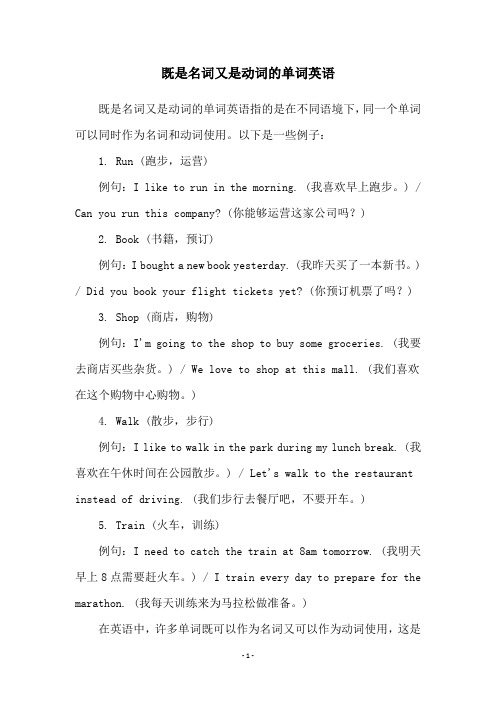
既是名词又是动词的单词英语既是名词又是动词的单词英语指的是在不同语境下,同一个单词可以同时作为名词和动词使用。
以下是一些例子:1. Run (跑步,运营)例句:I like to run in the morning. (我喜欢早上跑步。
) / Can you run this company? (你能够运营这家公司吗?)2. Book (书籍,预订)例句:I bought a new book yesterday. (我昨天买了一本新书。
) / Did you book your flight tickets yet? (你预订机票了吗?)3. Shop (商店,购物)例句:I'm going to the shop to buy some groceries. (我要去商店买些杂货。
) / We love to shop at this mall. (我们喜欢在这个购物中心购物。
)4. Walk (散步,步行)例句:I like to walk in the park during my lunch break. (我喜欢在午休时间在公园散步。
) / Let's walk to the restaurant instead of driving. (我们步行去餐厅吧,不要开车。
)5. Train (火车,训练)例句:I need to catch the train at 8am tomorrow. (我明天早上8点需要赶火车。
) / I train every day to prepare for the marathon. (我每天训练来为马拉松做准备。
)在英语中,许多单词既可以作为名词又可以作为动词使用,这是英语中的一种常见现象,需要根据语境来理解其具体含义。
英语名词做动词作文模板

英语名词做动词作文模板Title: Using Nouns as Verbs。
In the English language, it is not uncommon for nouns to be used as verbs. This phenomenon, known as verbing, has become a common practice in everyday speech and writing. In this article, we will explore the concept of using nouns as verbs and discuss its impact on the English language.Verbing, or the process of using a noun as a verb, has been a topic of debate among linguists and language purists. While some argue that it is a natural evolution of language, others believe that it leads to the degradation of the English language. Regardless of the controversy, verbing has become an integral part of modern English usage.One of the main reasons for the prevalence of verbing is the need for new words to describe new concepts and technologies. As society advances, new inventions and innovations emerge, and the English language must adapt to accommodate these changes. In many cases, nouns are repurposed as verbs to describe these new phenomena. For example, the noun "text" has been verbed to describe the act of sending a text message, and "Google" has become a verb to describe the act of searching for information online.Verbing also allows for greater flexibility and creativity in language use. By using nouns as verbs, speakers and writers can convey complex ideas and concepts in a concise and efficient manner. This flexibility is especially useful in fields such as technology, where new terms and concepts are constantly being introduced.However, the use of nouns as verbs is not without its drawbacks. Some argue that it leads to confusion and ambiguity in communication. When a noun is repurposed as a verb, its original meaning may become diluted or altered, leading to potential misunderstandings. Additionally, the overuse of verbing can lead to a lack of precision and clarity in language use.Despite these concerns, verbing has become an accepted practice in modern English usage. It has even been embraced by some of the most respected writers and speakers inthe English language. For example, Shakespeare was known for his creative use of verbing, and many of his coined verbs have become standard usage in the English language.In conclusion, the use of nouns as verbs, or verbing, has become a common practice in modern English usage. While it has its critics, verbing allows for greater flexibility and creativity in language use, and it is a natural response to the ever-changing nature of society and technology. As the English language continues to evolve, verbing will likely remain a prominent feature of its usage.。
英语名词译为汉语动词的五种情况
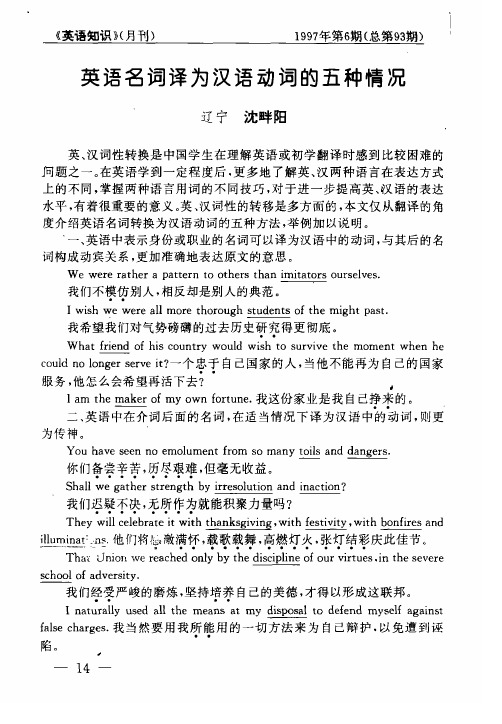
t
y ?
a s
t
o
be
t
hu
s
d e lu d e d
t
o
t
h
e
0 5 5
f
t
h
o n
e
,
a
n
t
h
e
i l
o
a
i
o
n
o
f
t
h
e
t
h
e r
难 道 国会 对 自 己 的尊
严 与职 责观 念 会 如此牢 固 竞会 受骗 以 致丧失尊 严 背 弃 职 责 吗 ?
、
、
四 以
。
一
o i
n
结 尾 的 英 语 名 词 可 直接根据其 动词 词 根 的 意 思 译为 汉 语动
1
n
a
,
,
。
t
u r a
ll y
.
u s e
d
a
l
t
he me
a
s n
a
t
m y d is p
o s a
l
t
o
de fe
n
d mys e lf
,
a
ga in
s
t
l a f 陷
e s
。
r g c a h e
s
我 当 然 要用 我 所 能 用 的 一 切 方法 来 为 自己 辩 护
以免遭到 诬
一
14
一
三 根 据英语 中多名 词 汉 语 中 多动 词 的 特点 把英语 中的 名 词 直接 译
s e r v e
? 一个 忠 于
英语名词转换为动词,动词转换为名词,形容词转换成副词,名词转换为形容词。

二、动词变为名词的方法
1.词形不变,词性改变。例如:work,study,water,plant等可以用作动词,也可以用作名词。
2.一些动词在词尾加上-er或-or之后就变成了表示“某一类人”的名词。例如:work—worker,teach—teacher,sing—singer,jump—jumper,play—player,learn—learner,visit—visitor,invent—inventor等。
2)少数以不发音的e结尾的名词变为形容词时,应去掉e再加-y。例如:noise—noisy,ice—icy等。
2.一些抽象名词在词尾加-ful可以变为形容词。例如:care—careful,thank—thankful,help—helpful,use—useful,beauty—beautiful等。
3.一些表示国家的名词可以在词尾加-ese,-ish或-n构成表示国籍、语言的形容词。例如:China—Chinese,Japan—Japanese,England—English,America—American,India—Indian,Australia—Australian(注意Canada—Canadian)。
4.以-l结尾的形容词变为副词时仍然要在词尾加-ly,而不是只加-y。除非是以-ll结尾的才在词尾只加-y。例如:usual—usually,careful—carefully,useful—usefully,full—fully等。
四、名词转化为动词:
book(n书—v预定);seat(n座位—v使就位;落座);water(n水—v浇水);shoulder(n肩膀—v负责任)
- 1、下载文档前请自行甄别文档内容的完整性,平台不提供额外的编辑、内容补充、找答案等附加服务。
- 2、"仅部分预览"的文档,不可在线预览部分如存在完整性等问题,可反馈申请退款(可完整预览的文档不适用该条件!)。
- 3、如文档侵犯您的权益,请联系客服反馈,我们会尽快为您处理(人工客服工作时间:9:00-18:30)。
4.wolf:狼吞虎咽
The starving man wolfed down the food。
饿汉狼吞虎咽地吃完了食物。
5.fish:取出(某物);捕捞
He fished out a coin for the boy.
他取出了一块硬币给这男孩。
6. crane:伸长脖子看
confined themselves to parroting textbooks。
总的来说,学生看来认真又用功,但是他们只是死背教科书。
12.beetle:(像甲虫一样)匆忙行走
After work we all beetled off for a drink.
下班之后,我们都匆匆忙忙去喝点什么。
Jack craned to see the coins in the well.
杰克伸长了脖子看水井中的硬币。
7. ape:模仿,仿效
Do not ape your betters.
不要效颦。
8.badger(獾):纠缠,缠住
If you badger him long enough,I’m sure he’ll agree.
snake:蜿蜒而行;拖拉(地上某物)
mop:用拖把拖洗[(+up)]
I was asked to mop the floor.
我被分配去拖地板。
dust:除去...的灰尘[(+off/down)]
hand 手 拿持
head 头 朝......方向前进
pig 、猪 (在肮脏处)挤、睡在一块儿
question:问题;怀疑
answer:回答;回答说,答道
talk:讲话;谈话,演讲,话题
walk:步行距离,步法;走
smoke:冒烟,喷烟;烟
smile:恩惠,好意,笑容;微笑
laugh:以笑表示...;笑,嘲笑
cry:要求,呼吁;哭
kiss:轻拂,轻触;吻
dream:梦;想像,幻想
13.bug:暗设窃听器;烦恼,折磨
The spy bugged enemy headquarters. .
间谍在敌军司令部暗设了窃听器。
14.worm:(虫一般)慢慢爬行;慢慢钻营
The soldier wormed his way toward the enemy’s lines.
chicken 小鸡 退缩,害怕
record记录 记录
present 礼物 送礼
1. dog:跟踪,尾随
Whenever I go,my little brother dog是尾随着我。
2.monkey:耍弄,乱搞
Don’t monkey with my television.
cook:烹饪;厨师
drink:饮料;喝
point:点,标记,想法;指出,指
watch:手表;看,观看
book:书,手册;预订,登记
dog:狗;指尾随某人,困扰某人或某事
charge:照顾、责任、命令;售价;充电
color:颜色,色彩;把……涂上颜色
cover:覆盖,笼罩;封皮,借口
士兵慢慢向敌人的防线爬去。
15.fox:行骗
To his mind everybody was dodging and foxing.
在他看来,人人都在搞鬼和行骗。
All the boys ran to put out the fire,but Mike chickened out.
男孩都跑去救火,迈克却退缩了。
11.parrot:鹦鹉学舌般地复述
On the whole,the students seemed serious and hard-working,but they
别乱动我的电视机。
3.snake:蜿蜒而行;拖拉(地上某物)
Since the train was snaking along at a brisk clip,the diner
swayed from side to side.
列车开始弯弯曲曲地急速前行之后,餐车便开始左右摇晃起来。
如果你老是缠住他,他就会同意了。
9.pig:(在肮脏处)挤、睡在一块儿
The hotels were all full so we had to pig it in an old hut for the night.
旅馆都客满了,我们只得在旧棚子里对付它一夜。
10.chicken:退缩,害怕
